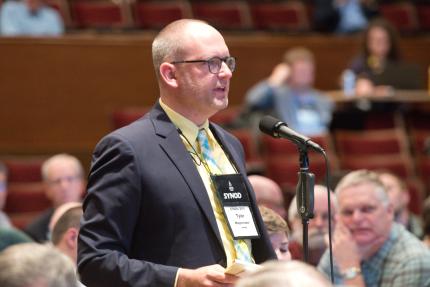Stance on Climate Change Remains

Tyler Wagenmaker told delegates he wasn’t trying to change anyone’s opinions, but questioned how previous decisions had been applied.
Karen Huttenga
Synod 2019 did not reverse its statements on climate change, but did ask the Council of Delegates to do some work to help determine what can be classified an ecclesiastical matter.
An overture from Calvary CRC in Ottawa, Ont. asked delegates to reconsider and withdraw “assertions” on climate change that had been made by a previous synod. Synod 2019 chose not to withdraw them, saying one was simply an observation not an assertion.
Synod also noted that “the Synod 2012 report ... has fostered good work through the CRC that we would not want to slow down.”
Tyler Wagenmaker, Classis Zeeland, said he had been present at the 2012 synod and recognizes this as a complex issue before a “diverse body of believers with a number of different viewpoints.”
He said he didn’t want to try to change anyone’s mind on the causes of climate change but his concerns lie in how the report has since been applied.
“There is a lot of angst about the application of this report, primarily by the Office of Social Justice … what kind of policies would we advocate for? That’s where the angst comes in, and I think that’s what this overture (request) was seeking to address in many ways,” he said.
As it deliberated on this issue, Synod 2019 had to consider two competing requests. In addition to the overture from Calvary CRC, Synod also received a request from Classis Grand Rapids East. This overture asked synod not accede to the other overture 8.
This kind of back and forth made synod move to clarify matters going forward.
It has asked the Council of Delegates to look at historical decisions of synod, specifically identifying the rationale behind “decisions dealing with political and/or justice matters” and how they were ruled to be properly before synod as “ecclesiastical matters.”
Synod asked that the COD report back to synod in 2020, by using one of its regular committees and/or an ad hoc group.
Jake Porter, Classis Holland said having clarity on this is imperative. “The world is groaning… we need to know what we can do within this body and what we can’t do … so that we might all witness to the new creation.”
Mike Vander Laan, B.C. South-East, questioned whether historical research could inform current decisions, saying deciding what constitutes an ecclesiastical matter is “only defined in the moment and not in the abstract.”
Anthony DeKorte, Classis Arizona, said it comes down to wisdom and a historical review is not needed. “There is nothing the COD will discover that will stop people from bringing things (they care about) to synod … because there is no square inch that doesn’t belong to Christ’s kingdom.”
But synod decided it wants to try for more clarity on defining “ecclesiastical.”
Don Bemis, Classis Holland, said, “We have had things come back and second-guessing what previous synods did.” Having a look back at history, he said, would be helpful “to see if we can draw conclusions.”
For continuous coverage of Synod 2019 including the live webcast, news, video recordings, photos, liveblog, social media links, and more visit www.crcna.org/synod.


